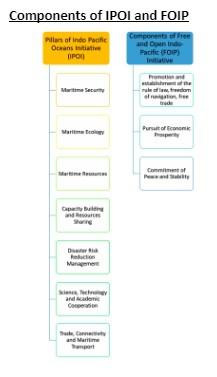Mains Daily Question
Sept. 26, 2023
Q2. Free and Open Indo-Pacific (FOIP) initiative of Japan and India's Indo-Pacific Oceans Initiative (IPOI) are complementary to each other. Comment. (10M/150W)
Approach
Introduction: We can introduce the answer by highlighting the outcome of India-Japan joint summit and how IPOI and FOIP was appreciated in it. We can also introduce by highlighting the importance of Indo-pacific region for India.
Body: Since the directive is to Comment, we need to state how FOIP and IPOI are complementary to each other by stating their various components. This must be followed by highlighting the differentiating aspect of both policies.
For value addition, you may state examples/facts in your arguments.
Conclusion: Here we can conclude either by summarizing the arguments of body section or by stating challenges surrounding Indo-pacific region.
Answer:
Free and Open Indo-Pacific (FOIP) initiative and Indo-Pacific Oceans Initiative (IPOI) are policy-measures of Japan and India respectively to address various challenges such as piracy, terrorism, proliferation of weapons of mass destruction (WMD), natural disasters and attempts to change the status quo by China in the Indo-pacific. Recently, in a joint summit (March 2022), India and Japan appreciated the complementary nature of both policy-measures.
Free and Open Indo-Pacific (FOIP) initiative and Indo-Pacific Oceans Initiative (IPOI) are complementary to each other in the following ways:
- Maritime Security: Owing to varied threats and economic importance of Indo-Pacific region, both FOIP and IPOI focuses on maintaining maritime security in the region.
- Maritime Connectivity: Japan is an official partner of maritime connectivity component of India’s IPOI. Under the component, both nations believe in strengthening transit and human resource connectivity in the region.
- Trade and Connectivity: Both IPOI and FOIP aim to work towards enhancing trade and connectivity by removing barriers. North East Connectivity Improvement Project in India is an example of India-Japan cooperation under IPOI and FOIP.
- Capacity Building and Information Sharing: Strong maritime domain awareness is the first step toward effective maritime enforcement capacity. India’s IPOI and Japan’s FOIP doctrine aims to develop a seamless, real-time, comprehensive overview of the larger Indo-Pacific area.
- Disaster Management: Cooperation in the field of disaster prevention is central to both India’s IPOI and Japan’s FOIP. Japan has know-how and technologies which India can use whereas India has requisite manpower/human resource.
Components of IPOI and FOIP
Differentiating Components of Free and Open Indo-Pacific (FOIP) initiative of Japan and India's Indo-Pacific Oceans Initiative (IPOI) –
- Maritime Ecology and Maritime Resources: Japan doesn’t share India’s IPOI sustainable use of marine resources in theory (not part of FOIP) and Australia is India’s partner in this component of IPOI.
- Air Space: Japan’s FOIP talks holistically not just about marine space but also air space. India’s IPOI focusses only on marine collaboration, protection, security and sustainable use of marine resources.
- Global Health and Food Security: FOIP talks about emergency food aid to support vulnerable countries and cooperating to achieve universal health coverage in Indo-pacific. IPOI is silent on these fronts.
- Cyber Security and Digital Connectivity: FOIP aims at seamless digital connectivity and enhancing cyber security in the region. India’s IPOI, on the other hand, focusses more on addressing its geopolitical needs w.r.t. Indo-pacific region.
Indo-pacific region faces multiple challenges in the form of China’s dominance, North Korean threat, marine pollution etc. However, owing to the significance of the region (generates 1/3rd of the world’s economic output), collaborative policy measures like IPOI and FOIP are needed.


